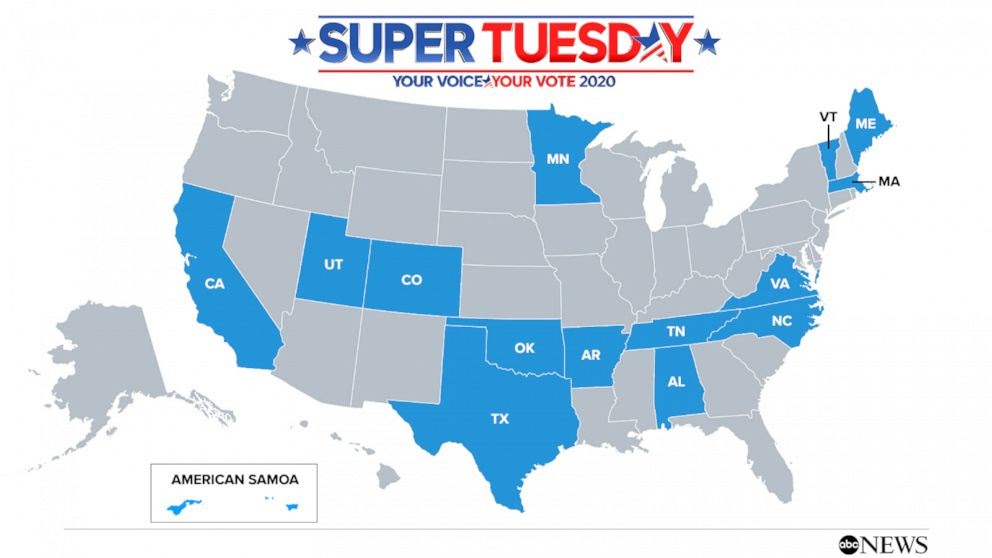What a Super Tuesday: Analysis of March 3rd

Courtesy of ABC News
By Jeremy Perillo
With over 1,300 delegates up for grabs, the stakes for Super Tuesday were high for all remaining candidates seeking the Democratic party’s nomination. What transpired throughout March 3rd, and continued a few days afterward, completely shifted the power dynamic of the Democratic primaries.
One of the first set of results to come in was Michael Bloomberg’s win in American Samoa, where he gained four delegates, with Tulsi Gabbard coming in second, gaining a single delegate. This showed a potentially positive indicator for Bloomberg’s campaign since Super Tuesday marked the first time he would be on the ballot officially.
Despite early signals, Bloomberg was only able to gain a handful of delegates from various states throughout the night. After spending nearly $500 million on television, radio and other media ads for several months, his sole win in American Samoa proved disappointing, leading to the suspension of his campaign on Wednesday.
Another disappointed candidate was Elizabeth Warren. She was unable to pull a large number of delegates from states, often coming in third place or lower. Most disappointing was her performance in her home state of Massachusetts. Not only was she unable to secure the top spot, but she was unable to get second, falling in third behind Bernie Sanders, only securing eleven of the ninety-one delegates pledged for Massachusetts.
With the crushing blow received Tuesday, Warren must determine what the best course of action for her campaign is; losing one’s home state is not something that promises much more success in the primaries. Some are calling for her to endorse Sanders, in her eventual campaign suspension.
The moderates were able to avoid splitting their votes ahead of Super Tuesday, with Pete Buttigieg and Amy Klobuchar suspending their campaigns and endorsing Biden. Unfortunately for Sanders, his success was largely stunted with Warren, another member of the liberal wing of the Democratic party. Sanders and Warren are too similar and having two very liberal candidates pinned against each other divided their votes, possibly costing Sanders’ night.
As of the writing of this article, Bernie has been named the winner of California, in addition to winning five other states. California, being the most delegate-rich state, was the golden egg of Super Tuesday with over four hundred pledged delegates. Even though Sanders has claimed the victory and has a three hundred thousand vote lead over Biden, it doesn’t mean Sanders will get all four hundred delegates, continuing to secure a tight delegate count.
Sanders’ lack of success stems from Joe Biden’s unsuspecting overhaul in eleven states. With a strong holding in the South, and the surprising win in Texas, Biden was able to get ahead of Sanders, rallying the former Vice President’s campaign. With many concerned that Sanders’ early wins were predictive of how the remaining primaries would go, Tuesday was a reassurance that Biden still has an opportunity to win the nomination.
The fact of the matter is that neither Biden nor Sanders are out of the woods yet. Super Tuesday started a new phase of the primaries for the Democratic party, knocking out significant competition for the frontrunners and hedging Biden and Sanders in a tight delegate battle that could very likely end up in a contested convention.







